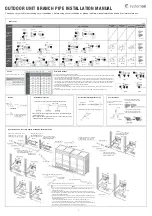
IM 889 / Page 2 of 4
Safety Information
Follow all safety codes. Wear safety glasses and work
gloves. Use a quenching cloth for brazing operations.
Have a fire extinguisher available. Follow all warnings
and cautions in these instructions and attached to the unit.
Consult applicable local building codes and National
Electrical Codes (NEC) for special requirements.
Recognize safety information. When you see a safety
symbol on the unit or in these instructions, be alert to the
potential for personal injury. Understand the meanings
of the words DANGER, WARNING, and CAUTION.
DANGER identifies the most serious hazards that will
result in death or severe personal injury; WARNING
means the hazards can result in death or severe personal
injury; CAUTION identifies unsafe practices that can
result in personal injury or product and property damage.
Improper installation, adjustment, service, maintenance,
or use can cause explosion, fire, electrical shock, or
other conditions which may result in personal injury or
property damage. This product must be installed only
by personnel with the training, experience, skills, and
applicable licensing that makes him/her “a qualified
professional HVACR installer.”
WARNING
The installer must determine and follow all applicable
codes and regulations. This equipment presents hazards
of electricity, rotating parts, sharp edges, heat and weight.
Failure to read and follow these instructions can result in
property damage, severe personal injury or death. This
equipment must be installed by experienced, trained
personnel only.
IMPORTANT
This product was carefully packed and thoroughly inspected
before leaving the factory. Responsibility for its safe delivery
was assumed by the carrier upon acceptance of the
shipment. Claims for loss or damage sustained in transit
must therefore be made upon the carrier as follows:
VISIBLE LOSS OR DAMAGE
Any external evidence of loss or damage must be noted
on the freight bill or carrier’s receipt, and signed by the
carrier’s agent. Failure to adequately describe such external
evidence of loss or damage may result in the carrier’s
refusal to honor a damage claim. The form required to file
such a claim will be supplied by the carrier.
CONCEALED LOSS OR DAMAGE
Concealed loss or damage means loss or damage which
does not become apparent until the product has been
unpacked. The contents may be damaged in transit due
to rough handling even though the carton may not show
external damages. When the damage is discovered upon
unpacking, make a written request for inspection by the
carrier’s agent within fifteen (15) days of the delivery date.
File a claim with the carrier since such damage is the
carrier’s responsibility.
Inspection
When the equipment is received, all items should be
carefully checked against the bill of lading to be sure all
crates and cartons have been received. All units should
be carefully inspected for damage when received. If
any damage is noticed, the carrier should make the
proper notation on the delivery receipt acknowledging
the damage. The carrier should also fill out a Carrier
Inspection Report. The McQuay International Traffic
Department should then be notified. The unit nameplate
should be checked to make sure the voltage agrees with
the power supply available. This unit is designed and
built for through-the-wall installation in either new
or existing buildings. The self-contained refrigerant
system delivers cooling to the desired space. Heating is
accomplished with a top mounted hydronic heating coil.
Each conditioner consists of the following components:
1. Cooling Chassis – Shipped separate in a single
carton.
2. Wall Sleeve – Shipped separate in a single carton
or in a multi-pack of 15.
3. Hydronic Heat Section – Shipped in a separate
carton.
4. Outdoor Louver – Shipped in a separate carton.
5. Room Cabinet – Shipped in a separate carton with
kickplate attached.






















